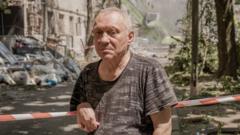Once a site for significant Western investments, the St. Petersburg Economic Forum now showcases Russia's move away from Western reliance, with guest appearances and sponsors reflecting this shift.
St. Petersburg Economic Forum Reflects Russia's Shift from the West

St. Petersburg Economic Forum Reflects Russia's Shift from the West
The St. Petersburg International Economic Forum this year highlights Russia's altered economic landscape and relationships post-Ukraine invasion.
The annual St. Petersburg International Economic Forum, once a symbol of Russia's growing engagement with the West, has taken on a markedly different tone in the wake of the Ukraine invasion in 2022. Historically, this event attracted major Western entities and celebrated lucrative multi-billion-dollar agreements, featuring influential leaders and global celebrities. However, this year’s forum, which commenced on Wednesday, is indicative of the seismic shifts in international relations and economic partnerships.
Under President Vladimir Putin, the conference was a hallmark for showcasing Russia as an inviting destination for business deals, highlighted by past partnerships including the controversial Nord Stream 2 pipeline agreement with Germany. Notable figures from companies like BP, Chevron, and Deutsche Bank graced the forum, alongside international guests such as French President Emmanuel Macron, and performances from renowned artists like Sting.
In stark contrast, this year’s event sees the Kingdom of Bahrain as the guest of honor, with the Chinese car manufacturer Tank as the official vehicle sponsor, replacing the once-coveted Mercedes. The atmosphere is devoid of the high-profile American investors that previously populated the venue; instead, a delegation from the Taliban made an appearance, illustrating a pivot towards alternative partnerships.
The conference's emphasis appears to reflect Russia's newfound stance of self-reliance, signaling an aversion to dependence on Western business ties. Although there were revived communications between Putin and President Trump, Western participation in the forum remains minimal and the once dynamic exchanges have devolved into invitation-only sessions focused on limited collaboration.
This year, the absence of international musical acts has left room only for lesser-known Russian artists, further underscoring the forum's transformation. The shift in tone and participation serves as a testament to Russia's ongoing estrangement from the West, setting a new course for economic relations in a landscape marked by geopolitical turmoil.





















